
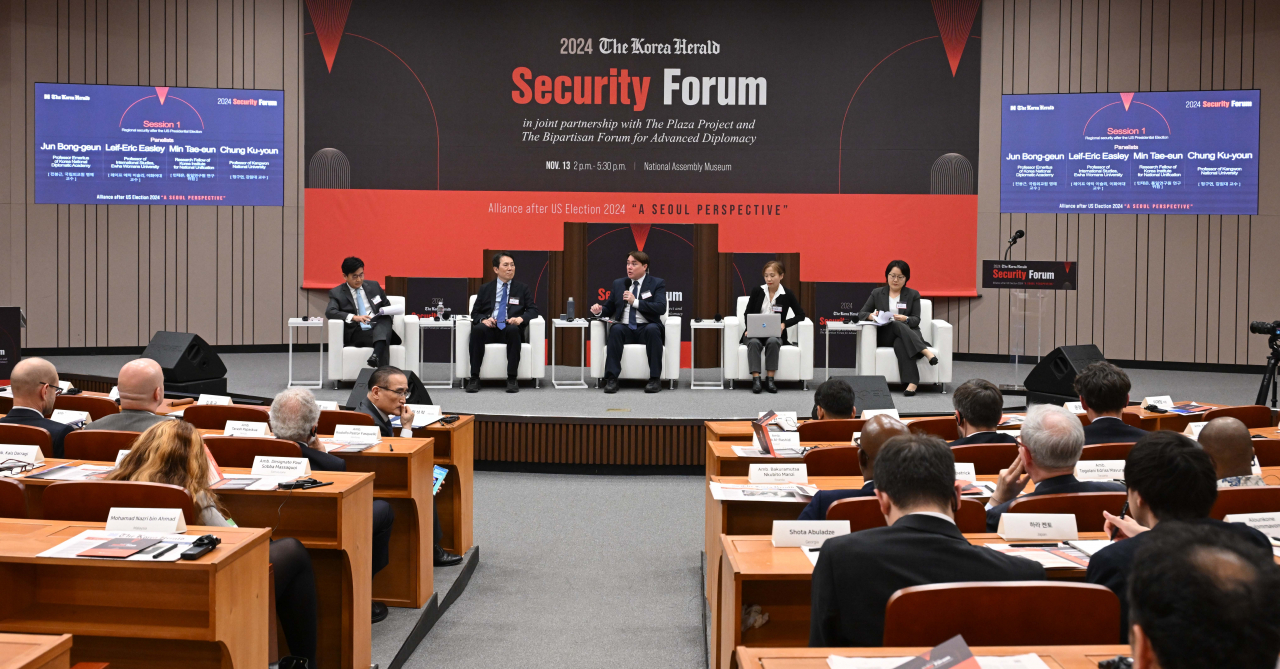 |
| The Korea Herald co-hosts the security forum, titled "Alliance after US Election 2024: A Seoul Perspective," was held at the National Assembly Museum on Wednesday in partnership with the Bipartisan Forum for Advanced Diplomacy, led by Rep. Wi Sung-lac, and The Plaza Project, a non-partisan think tank registered with the National Assembly. From left: Former Vice Foreign Minister Choi Jong-moon; Jun Bong-geun, professor emeritus of Korea National Diplomatic Academy; Min Tae-eun, research fellow at the Korea Institute for National Unification; Chung Ku-youn, professor at Kangwon National University and Leif-Eric Easley, professor of international studies at Ewha Womans University, at the first session "Regional Security After the US Presidential Election." (Lee Sang-sub/ The Korea Herald) |
As US President-elect Donald Trump’s second term augurs the resurgence of his "America First" policy, a consistent message resonated at a timely Korea Herald forum: Seoul must forge a strategic pivot, carefully balancing its role as a US ally with its own autonomy and core interests.
At the “Alliance After the US Election 2024: A Seoul Perspective” security forum held Wednesday at the National Assembly Museum, a pressing question took center stage: How can South Korea navigate the inevitable shifts and uncertainties of "Trumpism" to mitigate risks and seize opportunities in foreign policy, security and trade?
Opinion leaders, lawmakers, and experts reached a consensus: Seoul must prepare for evolving demands and expectations from Washington, carefully balance strategic concessions with the protection of its national security and core interests, and strengthen self-reliance.
Choi Jin-young, CEO and publisher of Herald Media Group, said South Korea "faces the task of redefining and reassessing the value of the alliance" with the return of Trump.
"The National Assembly and the government must amplify our voice and develop an autonomous yet cooperative diplomatic strategy amid evolving global dynamics," Choi said in his opening speech.
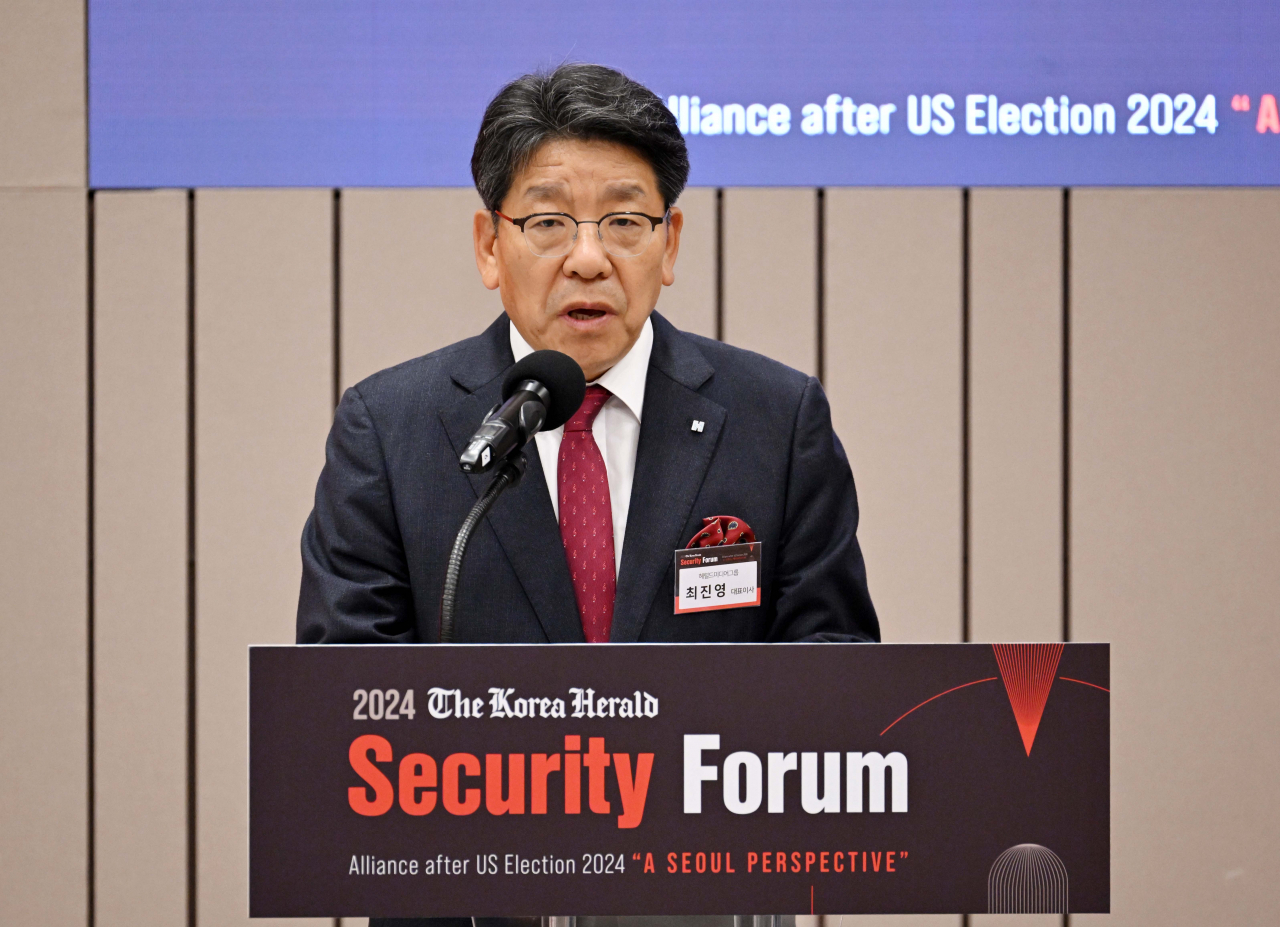 |
| Choi Jin-young, CEO and publisher of Herald Media Group, delivers his opening speech at the Korea Herald Security Forum on Wednesday. (Lee Sang-sub/ The Korea Herald) |
The forum was held in partnership with the Bipartisan Forum for Advanced Diplomacy, led by Rep. Wi Sung-lac, and The Plaza Project, a nonpartisan think tank affiliated with the National Assembly, headed by Kim Heung-kyu, director of the US-China Policy Institute at Ajou University.
The event brought together lawmakers from rival parties, ambassadors and diplomats from 35 embassies, as well as figures from academia and government. The list included Deputy Speaker of the National Assembly Joo Ho-young as well as Reps. Yoon Sang-hyun, Jung Sung-ho, Lee Un-ju, Kim Dai-sik, Lee Sang-hwi, Yu Yong-weon and Ahn Do-geol.
Both Choi and Wi underscored the need to chart a new direction for South Korean diplomacy and fine-tune its strategic responses to safeguard national interests.
"South Korea needs a strategy that strengthens the South Korea-US alliance and fosters South Korea-US-Japan cooperation, tailored to the realities of the Trump era, while also finding ways to navigate increasingly adversarial relations with North Korea, China and Russia," Wi said in his opening remarks.
Wi underscored the importance of adopting a "comprehensive and holistic approach" in engaging with the United States, Japan, China and Russia, urging a departure from the conventional approach of treating each relationship in isolation.
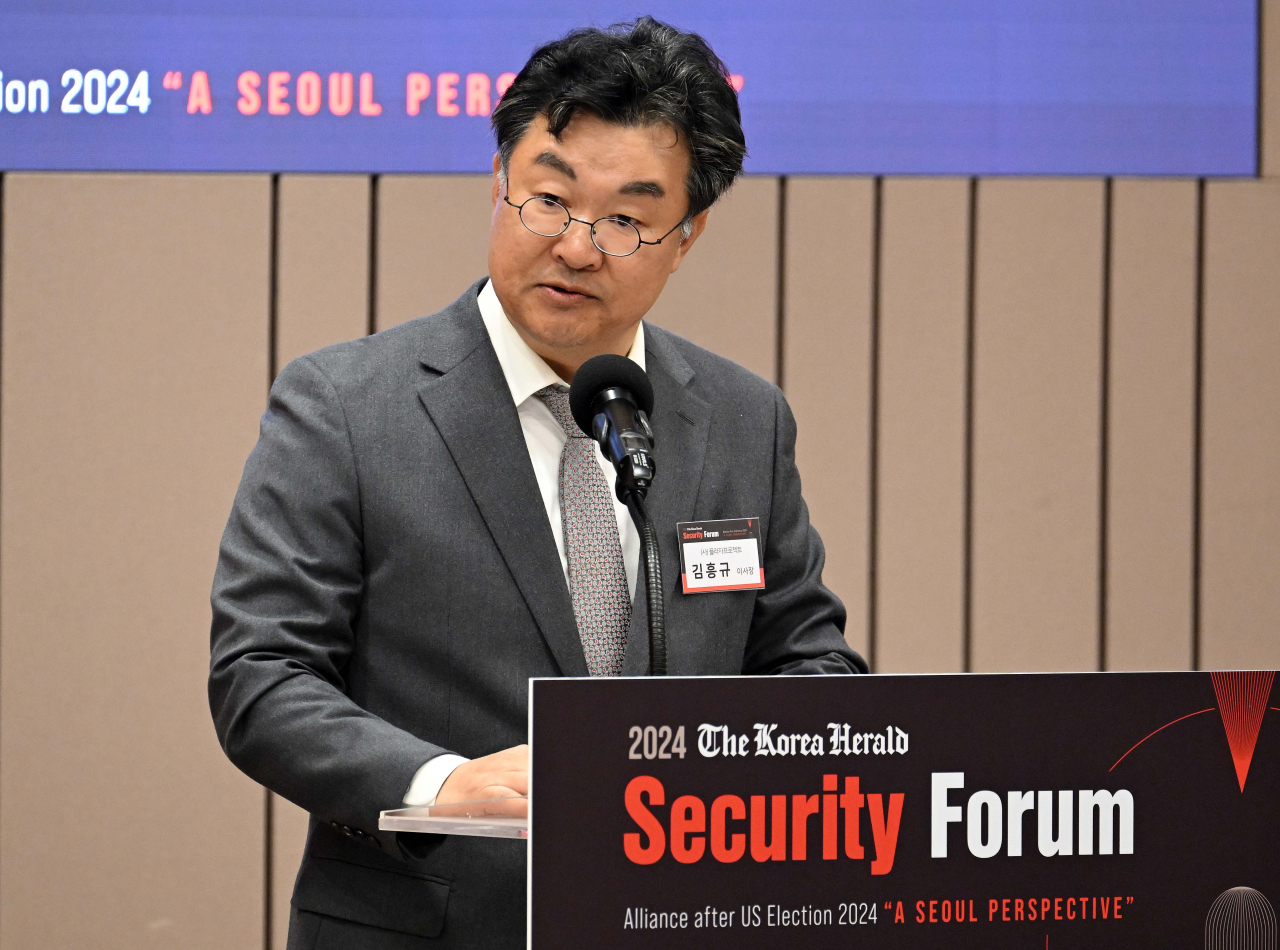 |
| Kim Heung-kyu, the presdient of the Plaza Project, a nonpartisan think tank affiliated with the National Assembl and the director of the US-China Policy Institute at Ajou University, delivers his opening speech at the Korea Herald Security Forum on Wednesday. (Lee Sang-sub/ The Korea Herald) |
Kim of the Plaza Project emphasized that developments and shifts accompanying Trump's return to the White House will have more profound implications for South Korea, where the alliance has remained a cornerstone of diplomatic, security and economic policies, irrespective of domestic political divides.
"Under the new US administration, we are likely to face intensified trade pressure, demands for increased defense cost-sharing, reshoring of key industries and potential adjustments to North Korea policy and China strategy," Kim said. "The global economy is expected to experience significant disruption due to the Trump administration's tariff escalation, presenting a substantial challenge for our own economy as well."
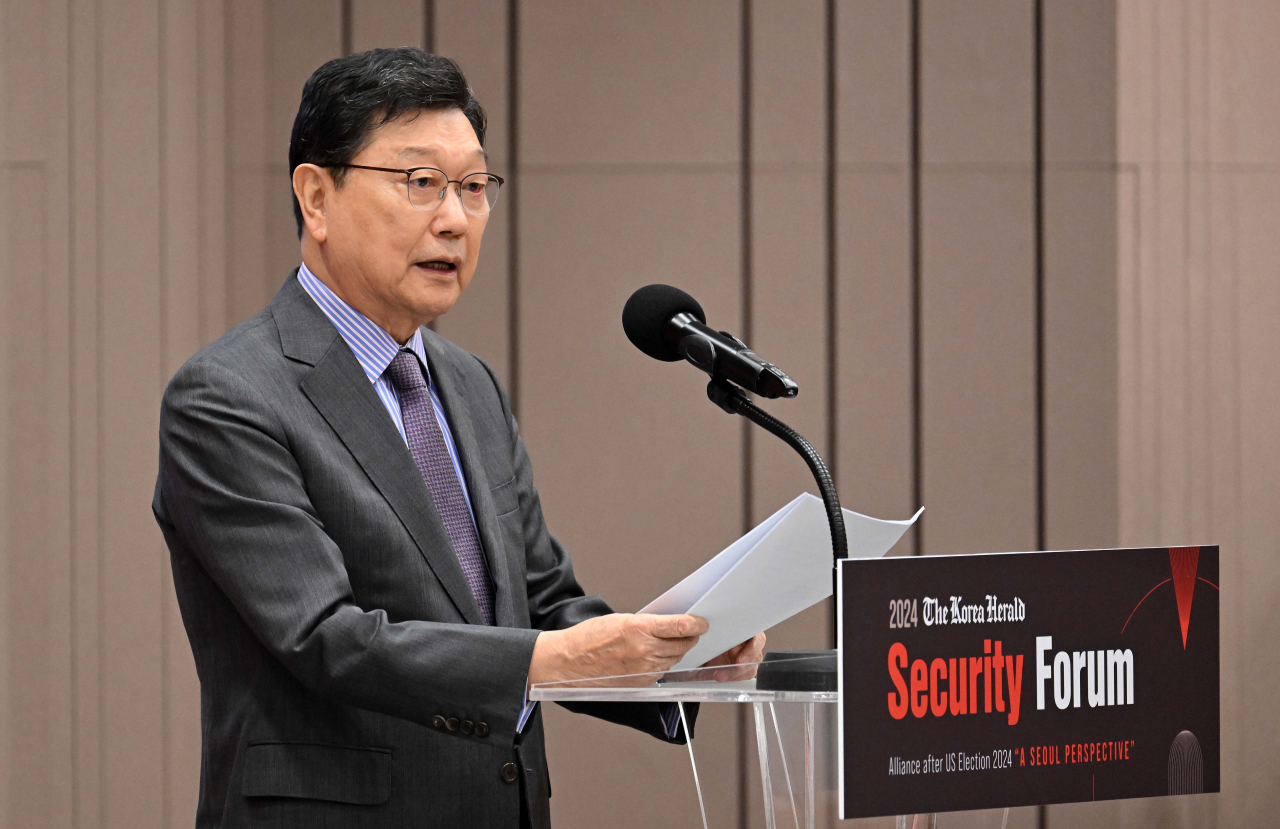 |
| Chung Duck-koo, founder and chair of the Northeast Asia Research Foundation and former Minister of Trade, Industry, and Energy, delivers a keynote speech at the Korea Herald Security Forum on Wednesday. (Lee Sang-sub / The Korea Herald) |
In a keynote address, Chung Duck-koo, founder and chair of the Northeast Asia Research Foundation and former minister of trade, industry and energy, highlighted, "The Korea-US alliance is not something to be traded away."
“Sailing in the same boat with a shared dream, a trust asset, complementarity in science, technology and industry and balanced national interests -- this represents the future value of the Korea-US alliance, and if these elements falter, the alliance will weaken amid fractures,” Chung said.
Chung, however, emphasized, "It is time for the Korean people to deeply recognize that it will be difficult for the US to remain South Korea's ultimate safeguard and lender of last resort indefinitely."
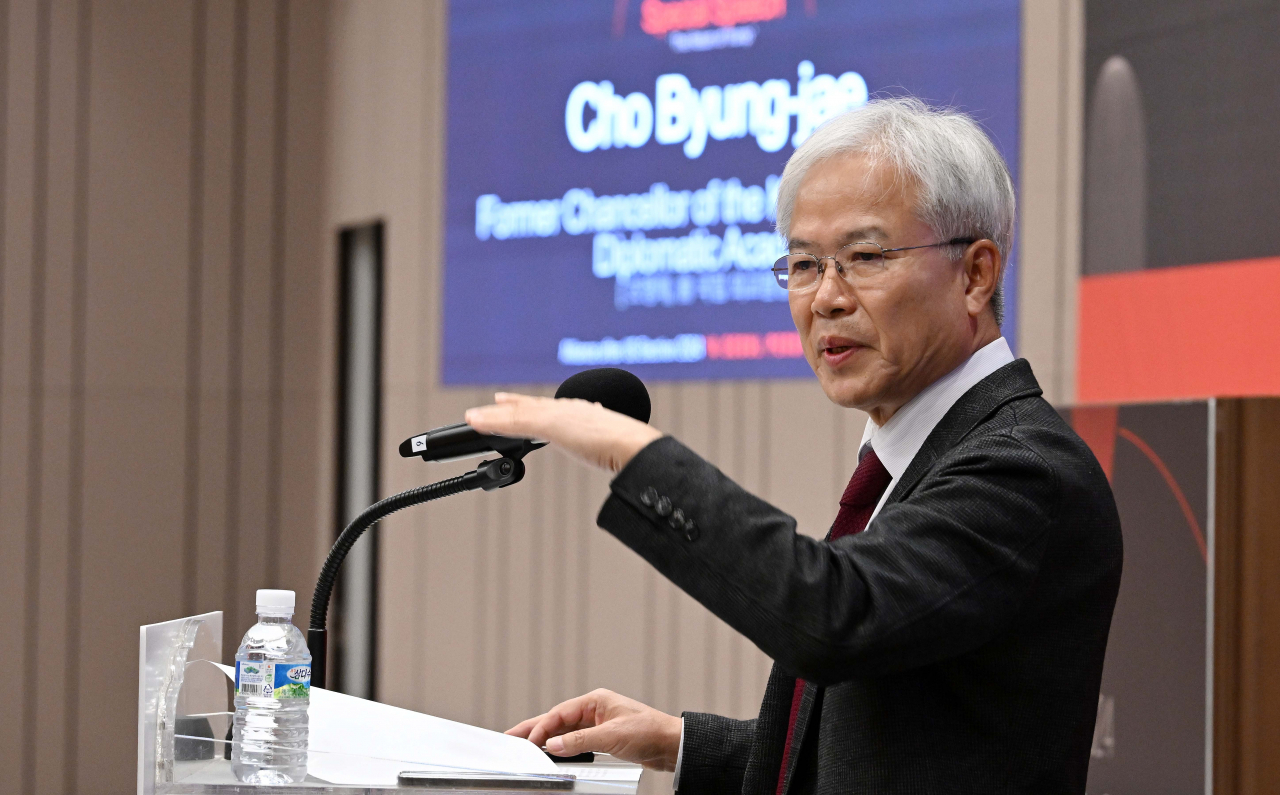 |
| Cho Byung-jae, former chancellor of the Korea National Diplomatic Academy and author of The Return of Trump: Crisis or Opportunity, speaks during a special session at the Korea Herald Security Forum on Wednesday. (Lee Sang-sub / The Korea Herald) |
Cho Byung-jae, former chancellor of the Korea National Diplomatic Academy and author of "The Return of Trump: Crisis or Opportunity," underscored ina special session that Seoul should focus on the implications of Trump’s three main domestic campaign pledges: tightening immigration controls, revitalizing American manufacturing and reducing overseas military interventions.
"If the United States decides not to play the role of the world's police, many countries that have grown accustomed to this will struggle to understand and accept the new order. South Korea is no exception. If it cannot be avoided, we must adapt," Cho said.
"However, I believe that the breadth and depth of the 70-year Korea-US alliance will provide the strength needed to navigate this transition."
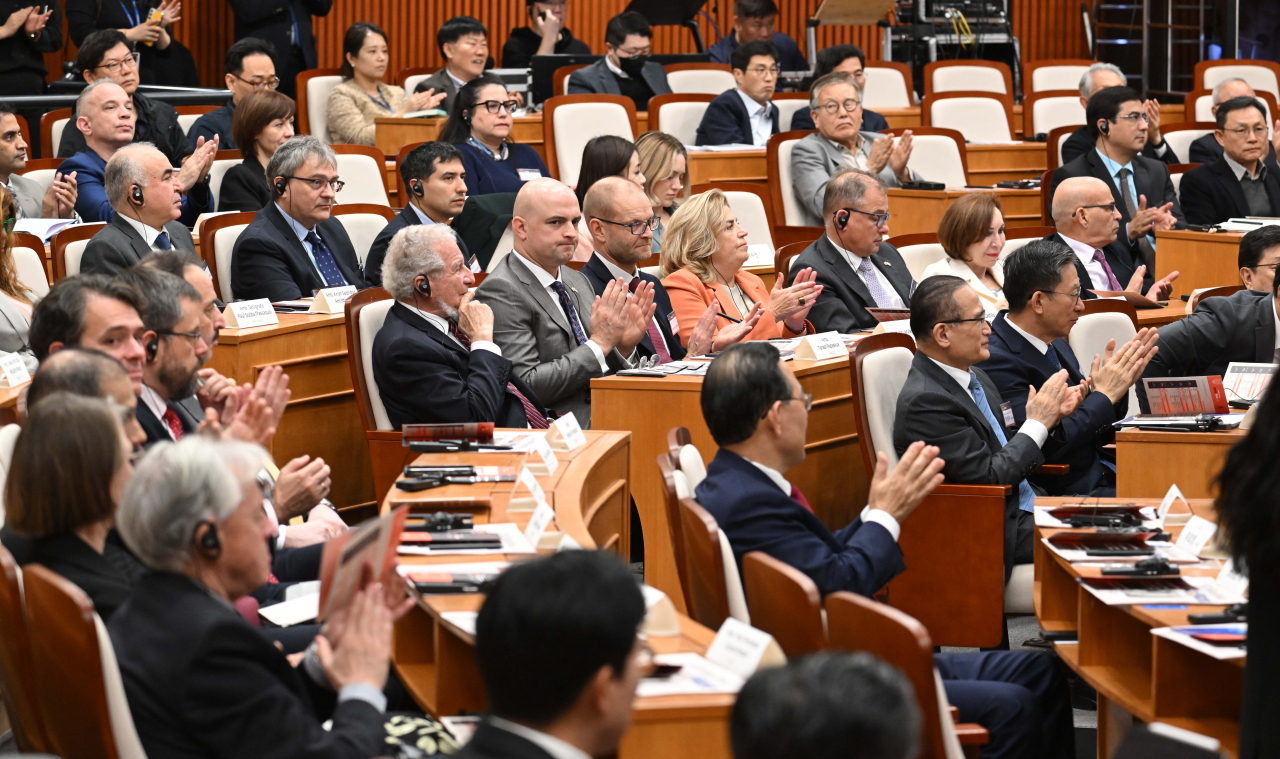 |
| Ambassadors and diplomats from 35 countries, along with dignitaries from the National Assembly, academia and government, applaud as The Korea Herald Security Forum 2024 opened at the National Assembly Museum in Seoul on Wednesday. (Lee Sang-sub/The Korea Herald) |
The first session featuring specialists on military, diplomacy and regional security, titled "Regional Security After the US Presidential Election," examined how South Korea should safeguard its interests in foreign policy, security and North Korea, including the potential renegotiation of defense costs-sharing under Trump and the potential of another summit between Trump and North Korean leader Kim Jong-un, featuring four Seoul-based experts.
Jun Bong-geun, professor emeritus at the Korea National Diplomatic Academy, noted a high likelihood of another Trump-Kim summit, stating South Korea has two options, including insisting on no rewards or summits until North Korea shows complete denuclearization.
"The other option is to find common interests through close South Korea-US coordination and impose those conditions on North Korea. We could support a summit if such demands are met."
Jun stated that South Korea must firmly oppose any US-North Korea agreement that undermines its security interests, such as halting long-range missile tests in exchange for tacit acceptance of nuclear weapons.
Chung Ku-youn, a professor of political science and diplomacy at Kangwon National University, said, "Viewing the defense costs-sharing negotiations merely as a financial bill is quite a narrow perspective," regarding Trump's potential calls to renegotiate the defense costs-sharing agreement with South Korea, which currently extends to 2030.
"The current US view on security burden-sharing is not simply about issuing an invoice, but is shifting toward a direction of mutual defense, which is a much larger issue that we need to understand," Chung said. "The question, then, is whether we can afford to pay more for defense costs and whether we can further integrate into the US-led security architecture."
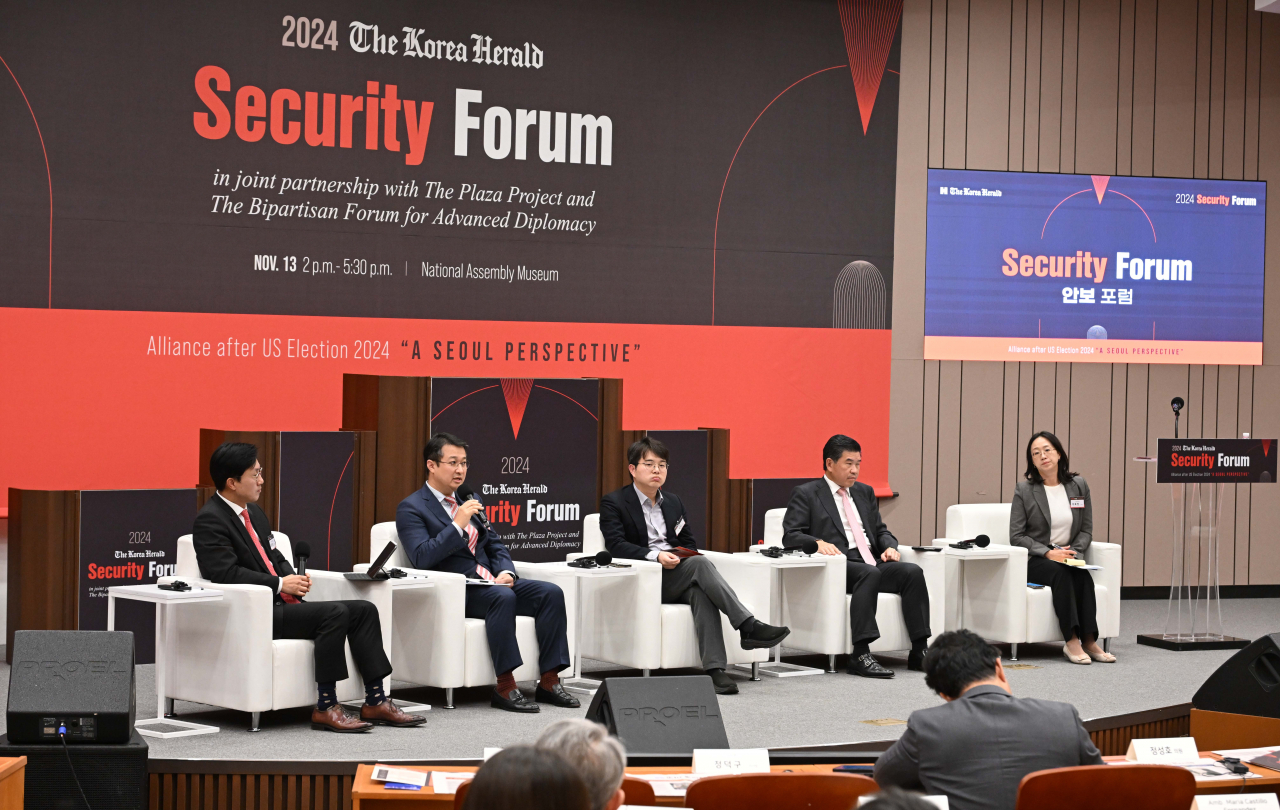 |
The second session, "Economic and Technological Security: Challenges and Opportunities," assessed opportunities and risks under a potential second Trump administration. Discussions covered Trump's plans for increased tariffs, the Trump Reciprocal Tariff Act, potential US withdrawal from the Indo-Pacific Economic Framework and impacts on free trade agreements with allies.
Lee Hyo-young, an associate professor of international trade and diplomacy at the Korea National Diplomatic Academy, stated, "Since trade policy continues to maintain a protectionist stance similar to that of the Biden administration, it may not necessarily pose a greater crisis."
"However, the impact on our companies will largely depend on how the Trump administration's trade policies targeting its allies evolve,'" Lee added, while pointing to opportunity factors such as Trump's expressed intent to enhance cooperation in the shipbuilding sector during his Nov. 7 phone call with Yoon.
James Kim, chair and CEO of the American Chamber of Commerce in Korea, said South Korean companies should instead focus on taking a "proactive approach as opposed to being scared about the situation."
"So if you want to really work closely with them, you have to know America, you have to be mainstream and you have to understand how Americans view these relationships."









